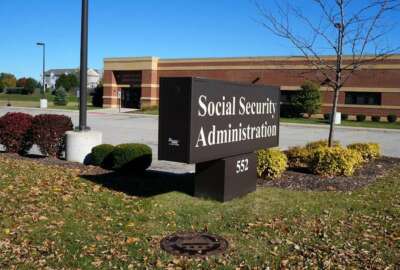Exclusive
Agency leaders should listen more, act on employees’ reentry feedback
In Federal News Network’s exclusive online survey on office reentry plans, many feds said returning to the office will worsen employee productivity, satisfaction...
Agencies have conducted town halls, held listening sessions and distributed surveys on return-to-office plans, but beyond listening, leaders should include employees’ feedback in actions.
Close to half of employees said leaders are not listening to their concerns or questions on office reentry in an exclusive Federal News Network online survey.
Leaders are “hearing but not listening,” one respondent wrote.
“Listening isn’t the same as acting on or responding to,” another wrote.
These are just a few of the responses Federal News Network received after asking a series of questions about agencies’ return-to-office plans.
One survey participant added: “They are hearing us, and I think to a certain extent they seem sympathetic, but they don’t seem to be wavering from their plans for us to return to the office despite two years of evidence showing we don’t need to report to the office in order to do our jobs well.”
Federal News Network collected 3,279 responses, with 72% saying they worked for a civilian agency, 15% working in the Defense Department and the rest in the intelligence community (FNN removed those who identified as retired workers from the data pool).
With many employees wanting maximum telework to continue, more than half of survey participants said they were dissatisfied with how their agencies are conducting return-to-office plans. That dissatisfaction creates a ripple effect.
“Productivity levels were at an all-time high while in a remote posture mainly because there were no extended commutes and traditional office-related distractions. Since returning, productivity has dropped, morale has dropped and motivation has dropped. Unfortunately, we have also lost several employees to other employers who have offered a full-time remote position,” one employee wrote.
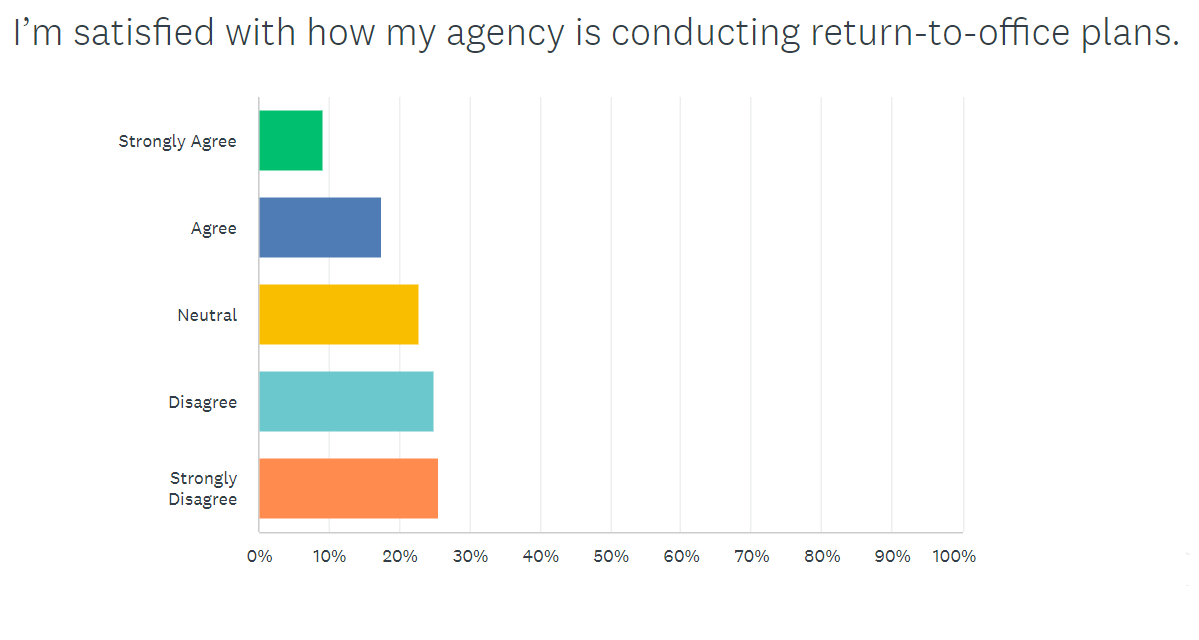
During the last two years, many employees said the pandemic showed they can continue supporting their agencies’ missions while working remotely. The responses varied across the board, but many said that flexibility, the lack of a commute and limited distractions actually made remote work more productive than in-office work.
“If anything, the government is getting more hours and productivity out of the federal workforce since they do not have to worry about [things like] long commutes or leaving for family events. More flexibility equals a greater willingness to produce at the highest levels,” a respondent wrote.
More telework means higher productivity
Many employees said they want agency leaders to make return-to-office plans that maximize telework for all positions that allow it.
More productivity, better work-life balance and higher employee satisfaction were common factors for many employees throughout the pandemic, the survey showed.
“The past two years have proven my position can be full-time remote without any impact to my organization’s mission,” one employee wrote.
Telework often limits distractions, employees said. In fact, more than half of survey participants said their productivity decreased when they were working in the office.
“One hundred percent of my work can be done remotely via telework. My productivity goes down when I’m in the noisy cubicle world of my office space. It’s impossible to have a professional phone call or present via Teams on the days I’m in the office due to all the background noise,” one respondent wrote.
Some, though, said they feel isolated and unsatisfied working remotely. One employee who recently joined the federal workforce said remote work was not helpful.
“As a newer federal employee, I do not feel like I have been well served by the virtual environment,” the respondent wrote.
It’s not just newer federal workers who said they like the idea of returning to the office. Several survey participants said in-office work was positive for them.
“I like face-to-face communication and wouldn’t mind more at office work, but I have also come to appreciate the flexibility and simplicity of working at home,” one respondent wrote.
“I believe two to three days at physical location and two to three days telework is ideal,” another wrote.
Overall, though, many survey participants said productivity was highest when they worked remotely.
“It’s obvious that work is reaching deadlines, even before in a few cases, with telework. I’m concerned that productivity will decrease once we go back in the office,” a respondent wrote.
Flexibility may solve federal retention issues
When it comes to making reentry plans, a common theme was the more flexibility, the better.
“Offering the most flexibility for determining return to office allows for adjusting better to returning to the physical workspace,” a respondent wrote.
Some also said office reentry plans, and a lack of flexibility for telework and remote work, may add to the seemingly endless problem of recruiting and retaining federal employees. Remote work policy affects younger generations’ desire to enter public service.
“Recruitment and retention will continue to lag until positions not facing the public are deemed remote eligible,” one respondent wrote.
This trend exists in other surveys as well. The third round of governmentwide pulse surveys showed many employees reporting that they would leave federal service for a job with more telework flexibilities — the pattern holds true even for better performing agencies.
Additionally, the Office of Personnel Management’s 2021 Federal Employee Viewpoint Survey showed a drop in employee satisfaction and engagement this past year, related in part to employees’ dissatisfaction with agencies’ office reentry plans.
Along with flexibility, commuting to work was a particularly sore subject in FNN’s survey. The commute was the most common reason causing return-to-office concerns, with 86% of employees saying that it worried them.
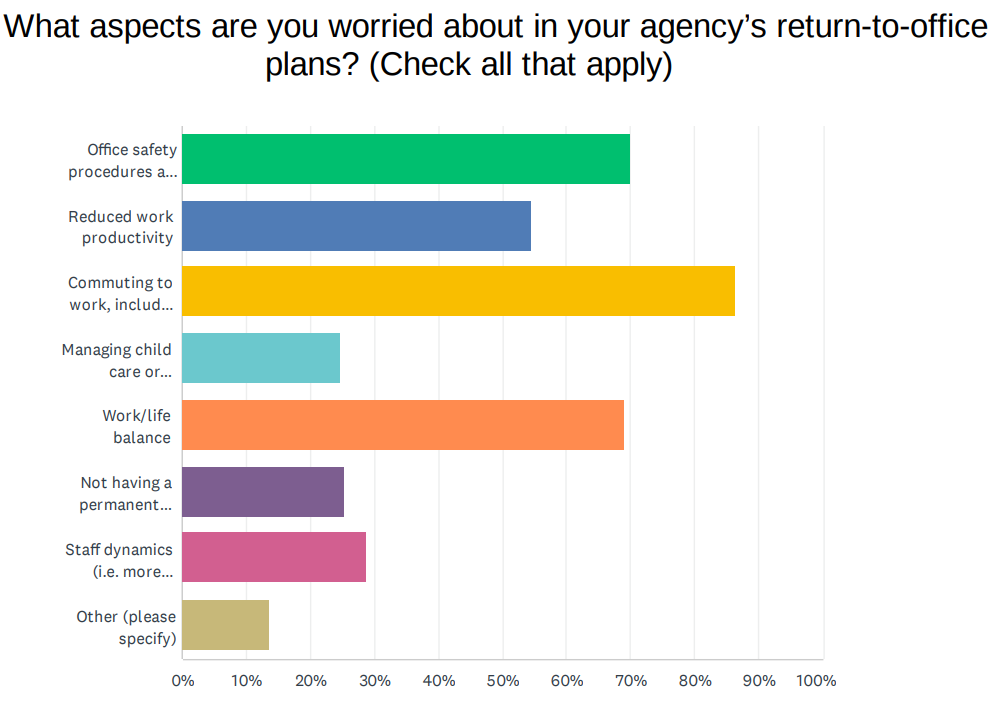
“It’s a waste to go into an office and do the exact thing I do at home without the 90-minute commute,” one respondent wrote.
Many others echoed similar feelings, saying the lack of a commute both improves productivity and gives back time in a day that they would have otherwise spent traveling to the office.
“Over the last two years, I have proven my ability to work productively from home on a full-time basis. This frees up three hours of my time each day, since I no longer need to get ready for work and endure a long commute both ways. My quality of life has improved significantly and my salary now goes much further without the expenses of commuting and eating in D.C.,” one survey participant wrote.
Along with commuting, office safety and work-life balance were other commonly shared concerns among respondents.
“Remote work is the best work-life balance. Why didn’t we do this years ago?” one wrote.
Leaders should not only listen, but also act
It’s important for agency leaders to listen and respond more to employees’ ongoing feedback, many respondents said.
The survey also showed a fairly even split when asking employees if they felt comfortable sharing their concerns with leadership.
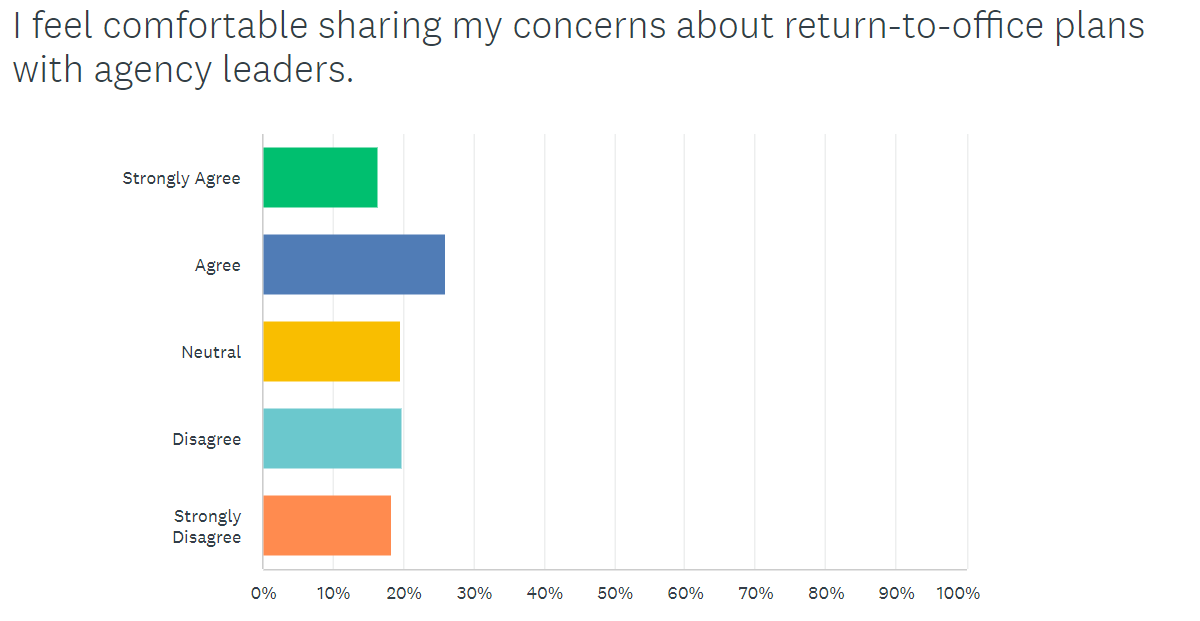
But some said it’s more than just about being able to raise issues with managers.
“I share my concerns, but they are not responding to any of them,” one respondent wrote.
Many employees said a simple “one-size-fits-all” approach, such as a blanket policy of two days in office per pay period, will not work. Some employees are public-facing, while many others can perform their jobs entirely remotely.
When asked if the Office of Management and Budget should offer more prescriptive guidance for agencies on return-to-office policies, close to two-thirds of respondents agreed.
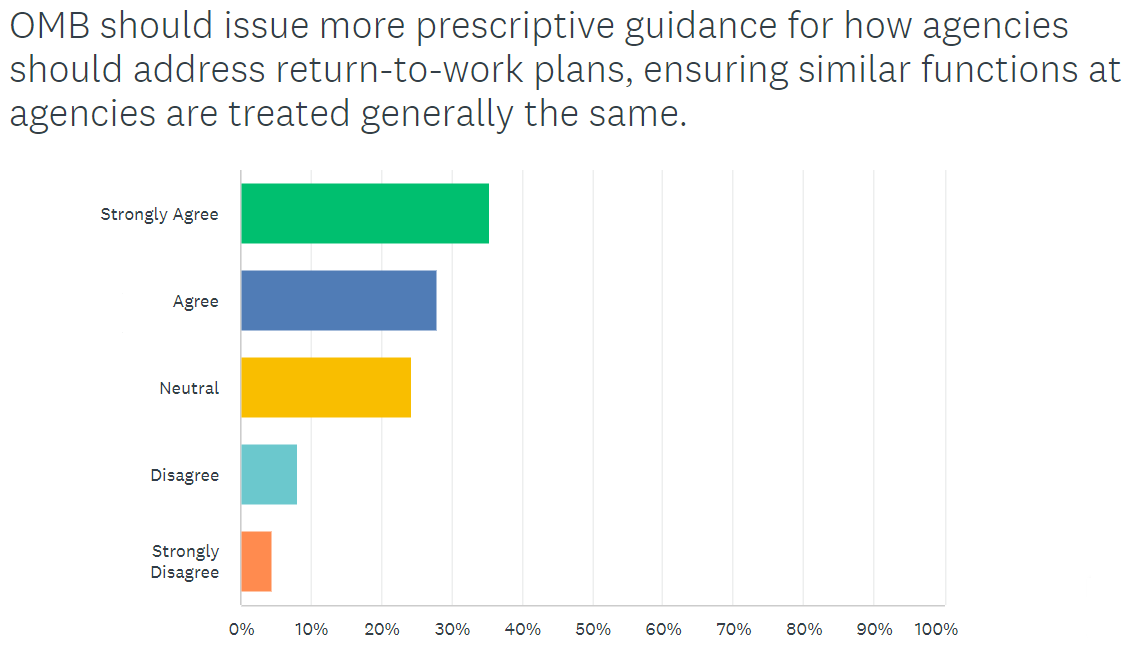
But many said OMB’s approach should vary based on the individual’s function. To maximize productivity and employee satisfaction, many respondents said agencies should implement a maximized telework policy for all those who can perform remotely.
“Return to the office plans should be tailored according to the agencies needs and the needs of the employees. A good balance can be established ensuring that everyone’s needs are met. I do not believe in the pre-COVID model of working from the office full time. What can be done via telework should be done that way. What can only be done in the office or a lab should be done in person. Both can be accommodated. Productivity is measurable,” one respondent wrote.
Some disagreed that OMB would be able to effectively implement a governmentwide policy. Standardized guidance may help some employees retain more work-from-home days, but others said they are already satisfied with their current telework arrangements that offer more telework flexibility than what a governmentwide standard might implement.
“I like how my agency is handling it and suspect they are doing a better job than most. I wouldn’t want to be held to a more restrictive policy,” a respondent wrote.
Another wrote: “I don’t think OMB knows the needs our agency better than our management does. One solution is rarely the best for multiple parties.”
Copyright © 2025 Federal News Network. All rights reserved. This website is not intended for users located within the European Economic Area.
Drew Friedman is a workforce, pay and benefits reporter for Federal News Network.
Follow @dfriedmanWFED






